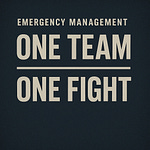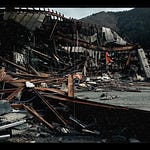Lessons of Resiliency From Theodore Roosevelt
Credit | Public Domain via Library of Congress | 1910
We talk about resilience in many ways. The field many of you reading this or listing to the podcast have chosen to pursue one that values resilience. The resilience of the community and the individual. The success stories that we share are of the hard-nosed individuals who recovered from the disaster and thrived after.
Today, we are starting a series on resilient leaders. And I could not have thought of a better way to start than with Theodore Roosevelt, or Teddy, as most call him.
Teddy Roosevelt stands as one of the greatest leaders in American history.
One of the most inspiring parts of TR’s leadership qualities and thought is that the lessons are just as useful today as they were 120 years ago. In addition, the lessons are cross-discipline, NGO, Emergency Management, government or private, business or military. Everyone can take something from his ideas and writings.
Let's start with the end. TR could have run for a third term (the 22nd amendment was ratified in 1951). He would have won. However, he stepped aside and supported his VP Taft to step in.
After leaving office in 1909—TR spent a year hunting in Central Africa. TR had a habit of going on adventures when he needed to clear his head. When he was done with the expedition, he decided to tour Northern Africa and Europe. He was treated as a celebrity and was invited to attend events and give speeches in Cairo, Berlin, Naples, and Oxford. On April 23, 1910, in Paris, TR gave one of his most widely quoted speeches. He stopped in Paris on April 23, and, at 3 p.m. at the Sorbonne, before a crowd that included, according to the Edmund Morris biography Colonel Roosevelt, “ministers in court dress, army and navy officers in full uniform, nine hundred students, and an audience of two thousand ticket holders,” Roosevelt delivered a speech called “Citizenship in a Republic,” which, among some, would come to be known as “The Man in the Arena.”
In addition to touching on his family history, war, human and property rights, the responsibilities of citizenship, and France’s falling birthrate, Roosevelt railed against cynics who looked down on men trying to make the world a better place.
“The poorest way to face life is to face it with a sneer,” he said. “A cynical habit of thought and speech, a readiness to criticize work which the critic himself never tries to perform, an intellectual aloofness which will not accept contact with life's realities—all these are marks, not ... of superiority but of weakness.”
Then he delivered an inspirational and impassioned message that drew huge applause:
"It is not the critic who counts; not the man who points out how the strong man stumbles, or where the doer of deeds could have done them better. The credit belongs to the man who is actually in the arena, whose face is marred by dust and sweat and blood; who strives valiantly; who errs, who comes short again and again, because there is no effort without error and shortcoming; but who does actually strive to do the deeds; who knows great enthusiasms, the great devotions; who spends himself in a worthy cause; who at the best knows in the end the triumph of high achievement, and who at the worst, if he fails, at least fails while daring greatly, so that his place shall never be with those cold and timid souls who neither know victory nor defeat."
The speech was a wild success. According to Morris—who calls it “one of [Roosevelt’s] greatest rhetorical triumphs”—“Citizenship in a Republic” ran in the Journal des Debats as a Sunday supplement, got sent to the teachers of France by Le Temps, was printed by Librairie Hachette on Japanese vellum, was turned into a pocket book that sold 5000 copies in five days, and was translated across Europe. Roosevelt, Morris writes, “was surprised at its success, admitting to Henry Cabot Lodge that the reaction of the French was ‘a little difficult for me to understand.’”
I want to end this introduction with ten leadership lessons from Theodore Roosevelt.
1. Leaders Are Created, Not Born. TR’s life and work are an enduring answer to the eternal question: are leaders born or made?
Roosevelt believed that leadership is an ongoing project of self-creation. He offered his life as a template for anyone seeking to re-create themselves into an effective leader.
“If I have anything resembling genius, it is in the gift of leadership…. I may be a source of encouragement to Americans by what I have accomplished without great gifts.”
2. Courage is the Foundational Virtue. Theodore Roosevelt was a warrior. His virtues and shortcomings are best evaluated with an eye toward the world in which he lived. Death was a constant companion. The consequences of the barbarism of the Civil War were very much in evidence in every part of American life.
In this world, courage was paramount. Physical courage was prized. Moral courage, perhaps even rare, was necessary for enduring service.
Roosevelt overcame a weak physical endowment and corresponding temperament. He aimed for his example to stir others—indeed the nation as a whole–to undertake the same transformation.
“There were all kinds of things I was afraid of at first, ranging from grizzly bears to “mean” horses and gunfighters, but by acting as if I was not afraid, I gradually ceased to be afraid.”
3. Action, Action, and Still More Action. Theodore Roosevelt had a consistent bias for action. He believed in the initiative. He could have been more comfortable and effective on defense, responding to a state of affairs set by others.
Whether it was the construction of the Panama Canal, taking on J.P. Morgan, or any other memorable challenges, TR took the risks of action over the greater (if sometimes less evident) risks of inaction or delay.
“Whatever I think is right for me to do, I do. I do the things that I believe ought to be done. And when I make up my mind to do a thing, I act.”
4. Put Your Team Ahead of Yourself. One of Roosevelt’s formative real-time leadership experiences was leading his regiment in the Spanish-American War.
TR led from the front. He placed himself in undeniable danger, remaining on horseback while facing a rain of steel.
He placed those he was serving before himself. As a result, many of the Rough Riders remained committed to him for the remainder of their lives.
“No man has a right to ask or accept any service unless, under changed conditions, he feels that he can keep his entire self-respect while rendering.”
5. Leaders are Learners. From youth, Roosevelt was a voracious reader: “Reading is a disease with me.”
TR’s curiosity, his ceaseless learning, never abated. The book, the classroom, and formal education were far from the only venues for learning. They produced many of those he called the “educated ineffectives.”
Roosevelt’s example, combining the life of ideas and the life of action, was central to his project of self-creation as a leader.
“As soon as any man has ceased to be able to learn, his usefulness as a teacher is at an end. When he can’t learn, he has reached the stage where other people can’t learn from him.”
6. Bring History to Life, Create the Future. Like Winston Churchill, TR was a practicing politician and an accomplished historian. He and intimates such as Senator Henry Cabot Lodge of Massachusetts frequently turned to historical exemplars as they dealt with contemporary problems.
“There is nothing cheaper than to sneer at and belittle the great men, deeds, and thoughts of a bygone time—unless it is to magnify them and ascribe preposterous and impossible virtues to the period.”
7. Maintain Open Channels With Adversaries. Many think in all-or-nothing terms: either you’re for me or against me. That can be appropriate in some circumstances, but at least as often, it’s not.
Roosevelt’s focus on results, on outputs rendered him flexible as to means. He would; he said, “work with the tools at hand.”
As governor of New York, TR met regularly with his frequent adversary and uneasy ally, the “Easy Boss,” Senator Thomas Collier Platt. This prompted criticism from critics who feared that such meetings would necessarily compromise Roosevelt or his positions on vital matters.
Roosevelt nonetheless maintained regular meetings and communications with Platt and other nettlesome personages:
“If my virtue ever becomes so frail that it will not stand meeting men of whom I thoroughly disapprove, but who are active in official life and whom I must encounter, why I shall go out of politics and become an anchorite. Whether I see these men or do not see them if I do anything for them improper, then I am legitimately subject to criticism; but only a fool will criticize me because I see them.”
8. Keep Commitments. Today, commitments are violated willy-nilly as they become inconvenient or undesirable. This has always been even more the case among politicians.
TR was notable in striving to meet commitments. He would meet commitments to his children to play, even if it meant that meetings of state would have to end.
Memorably, he declined numerous entreaties to walk back his commitment, made impulsively on election night in 1904, not to seek re-election in 1908.
In TR’s reckoning, holding to his word was vital to earning and maintaining the trust of those he served:
“It is a peculiar gratification to me to have owed my election…above all to Abraham Lincoln’s “plain people’; to the folk who worked hard on the farm, in the shop, or on the railroads, or who owned little stores, little businesses which they managed themselves. I would, not figuratively, rather cut off my right hand than forfeit by any improper act of mine the trust and regard of these people…. I shall endeavor not to merit their disapproval by any act inconsistent with the ideal they have formed of me.”
9. Family First. Roosevelt was a dedicated family man. To a notable extent, he was an attentive father and husband for a public figure holding great responsibility.
“There are many kinds of success worth having. It is exceedingly interesting and attractive to be a successful businessman, railroad man, farmer, or a successful lawyer or doctor, writer, President, ranchman, or colonel of a fighting regiment or to kill grizzly bears and lions. But for unflagging interest and enjoyment, if things go reasonably well, a household of children certainly makes all other forms of success and achievement lose their importance by comparison.”
10. Be Authentic: Live Your Values. Roosevelt was authentic in the true sense: he was the author of his character. He strove to live his demanding values, the better to serve a nation that could advance by the same values.
“Most of all, I believe whatever value my service may have, comes even more from what I am than from what I may do.”
Next week we will discuss how TR transformed himself from a fragile, sick child into one of America's most famous outdoorsmen.
Podcasts
The Todd DeVoe Show
Building Resiliency One Community at a Time
EPISODE 43 BY TODD DEVOE
Community resilience often focuses on growing the capacity to “bounce back” from disruptions. These can be natural disasters, human-caused events, and even war. Preparing for disruption is the only way to build resilience as we strive to build robust community resilience programs. It is sometimes hard to figure out where to start. The program should engage and benefit the entire community. It is critical to consider all the challenges the community may face. It may be an economic disaster that the community is facing or a tsunami. However, together the community will survive. Join Todd as he sits down with Andrea Davis and discusses The Resiliency Initiative and her vision to bring programs to communities worldwide.














Share this post